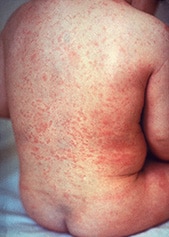How infectious diseases are spread and simple and practical advice for preventing the spread of infection in the home and community
Rubella (German measles) - including symptoms, treatment and prevention
Rubella (German measles) is an infection caused by the rubella virus.
Rubella is a notifiable condition1
How rubella is spread
Rubella is spread:
- When an infected person talks, coughs or sneezes small droplets containing infectious agents into the air. The droplets in the air may be breathed in by those nearby.
- By indirect contact with hands, tissues or other articles soiled by nose and throat discharges.
Signs and symptoms of rubella infection
 Rubella infection in a woman in the first 8 to 10 weeks of pregnancy results in death of or damage to the fetus in up to 90% of cases. Multiple defects are common (for example, deafness, blindness, brain and heart damage, and mental handicap) and late complications are being increasingly recognised. The risk lowers to about 10 to 20% if the mother gets rubella at 16 weeks gestation and defects are rare after 20 weeks.
Rubella infection in a woman in the first 8 to 10 weeks of pregnancy results in death of or damage to the fetus in up to 90% of cases. Multiple defects are common (for example, deafness, blindness, brain and heart damage, and mental handicap) and late complications are being increasingly recognised. The risk lowers to about 10 to 20% if the mother gets rubella at 16 weeks gestation and defects are rare after 20 weeks.
In other people, rubella is a mild disease. Symptoms, when present, may include:
- fever
- headache
- runny nose
- conjunctivitis (inflammation of the lining of the eyelids and eye)
- rash (see image)
- swollen glands (especially at the back of the neck)
- joint pain.
Symptoms, particularly joint pains, are more severe in adults.
Diagnosis of rubella infection
Rubella is diagnosed by a blood test. Clinical diagnosis based on the appearance of the rash is unreliable.
Incubation period
(time between becoming infected and developing symptoms)
16 to 18 days with a range of 14 to 23 days.
Infectious period
(time during which an infected person can infect others)
Up to 7 days before and at least 4 days after appearance of the rash.
Treatment for rubella infection
There is no effective antiviral treatment for rubella. Treatment of symptoms includes plenty of fluids and pain relief if required. Paracetamol may be used to reduce fever and pain. Aspirin should not be given to children under 12 years of age unless specifically recommended by a doctor.
Prevention of rubella infection
- Exclude people with rubella from childcare, preschool, school and work until fully recovered or for at least 4 days after the onset of the rash.
- Rubella is best prevented by the measles, mumps and rubella (MMR) combination vaccine or the measles, mumps, rubella and varicella (MMRV) combination vaccine. Most people who have two doses of a rubella-containing vaccine will be protected against rubella infection.
- Vaccination after exposure will not prevent infection.
- All health care and childcare staff (men and women) should be assessed for immunity to rubella and if not immune, should be immunised.
- Anyone with suspected rubella should consult a doctor both to check that the diagnosis is correct and so that contacts (in particular, pregnant women) can be advised. A contact is any person who has been close enough to an infected person to be at risk of having acquired the infection from that person.
Pregnant women
In addition to the above prevention points, all pregnant women:
- Should be tested for immunity to rubella prior to, or during early pregnancy. If found not to be immune, MMR vaccination is given after delivery of the baby but before discharge from the maternity unit. Rubella vaccine should not be given to a woman known to be pregnant and pregnancy should be avoided for one month after vaccination.
- With suspected rubella or exposure to rubella should seek specialist obstetric advice, regardless of a history of rubella or rubella vaccination. Rubella re-infection, often without symptoms, can occur in individuals who have had previous infection or vaccination, although fetal damage is very rare in these cases.
Useful links
- Immunisation
- Vaccines
- Immunisation programs
- Get immunised
- Exclusion periods from childcare, preschool, school and work
- When you have a notifiable condition
1 – In South Australia the law requires doctors and laboratories to report some infections or diseases to SA Health. These infections or diseases are commonly referred to as 'notifiable conditions'.
Image - Rubella. Image courtesy of Public Health Image Library (PHIL), Department of Health and Human Services, Centers for Disease Control and Prevention (CDC-USA)